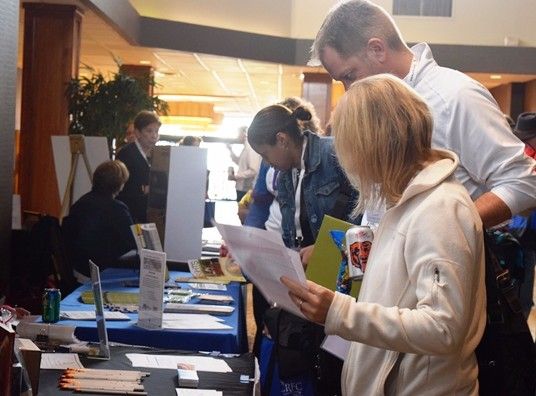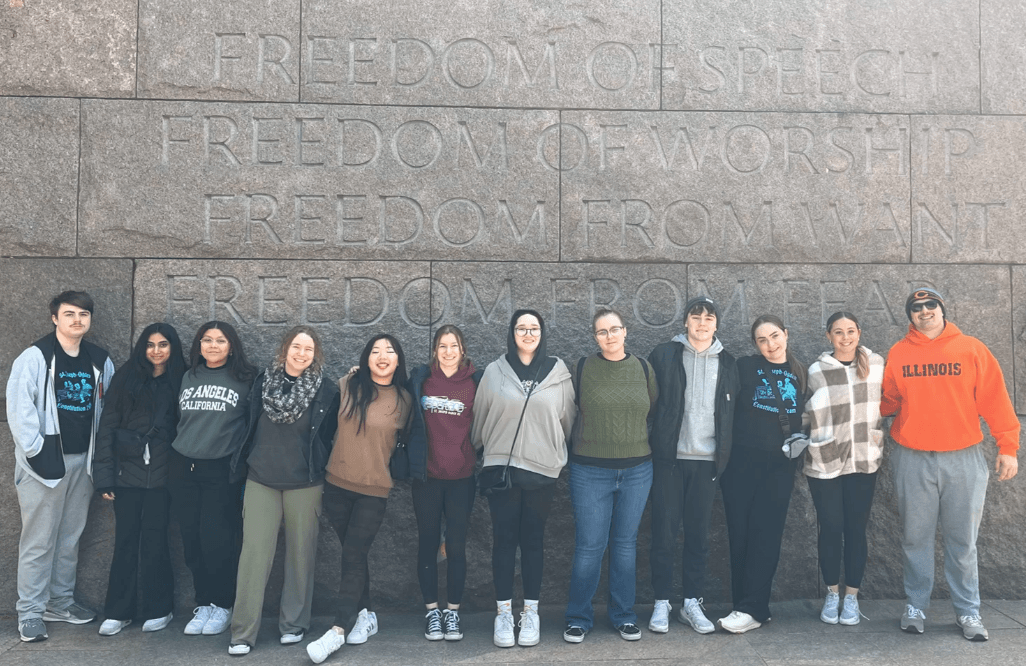2025 Workshops
Guardians of Democracy: Law, History & the Classroom
Guardians of Democracy: Law, History, & the Classroom is a one-day professional development conference for educators and is the theme for this year's conference.
In an era of rapid change and rising challenges to democratic institutions, the classroom remains one of our most powerful tools for sustaining civic life. This year’s theme invites us to explore the vital role educators play in protecting democracy through rigorous instruction in law, civics, and history. Sessions will span landmark legal cases, pivotal moments in democratic development, and best practices in teaching for civic engagement and civil discourse—especially in today’s divided climate.
Workshop Descriptions
Here is a partial list of this year's workshops:
From Agencies to Action
Presenter: Leah Whitesel
This session teaches the basics of administrative law research, including how to navigate the Federal Register and regulations.gov. Participants will learn how to submit comments on proposed regulations. All of the resources are freely available online.
The Flossmoor Veterans’ Time Machine: Supporting the Next Generation of Civically Engaged Students
Presenter: Dr. Kristine M. Condon
Flossmoor Veterans’ Memorial, Inc. (FVM), is an Illinois 501(c)(3) non-profit organization constructing a Veterans’ Memorial Wall of Honor for the Village of Flossmoor. In 2024, FVM designed and delivered “The Flossmoor Veterans’ Time Machine” project to 300 eighth-grade and seventh-grade humanities students enrolled in Flossmoor School District 161. With content mapped to the Illinois Learning Standards for Social Science, a complete set of instructor and student materials, and ADA-compliant instructional videos, FVM designed a comprehensive, ready-to-deliver local history program. Learn about our partnership with District 161 and review the strategies we used, including the assessment data we collected. We’ll also offer a demonstration of a “Flossmoor Veterans’ Time Machine” lesson that has earned a 2025 Illinois State Historical Society “Best of Illinois History” award.
Teaching With SCOTUS: The Stories Behind the Cases
Presenter: David Olson
Studying the Court’s ability to influence public discourse and shape policy, has been and will remain, an essential element of civics and history classrooms. But how do we make opaque legal and constitutional decisions clear for our students? We connect them to the stories of real people and issues. Participants will examine this collection of Retro Report films and lessons to help students connect with historic and contemporary cases. From Korematsu to Nixon, from Affirmative Action to Gerrymandering, these resources will help students grapple with the complexities of Supreme Court decisions and their consequences.
Can the President Do That? Resources for Teaching About Executive Power
Presenter: David Olson
This session offers a fresh approach to teaching executive power by using historical case studies to help students critically examine contemporary debates about presidential authority. Rather than focusing solely on modern politics, this session demonstrates how key moments in U.S. history provide essential context for understanding the executive branch today. By engaging with Retro Report’s short documentary films and inquiry-based lesson activities, educators will gain strategies for helping students make meaningful connections between past and present.
Transform Current Events into Teachable Moments with Civil Conversation
Presenter: Robert Medrano
Students are eager to discuss the world and share their perspectives. The Civil Conversation (CivCon) method transforms their curiosity and enthusiasm into an exercise of mutually respectful discussion of current events and issues that are important to their lives. As a result, students practice empathy, critical thinking, and gain a deeper understanding of relevant issues and topics. Participants will receive free access to ready-to-use classroom resources.
Teaching Social Movements as Pathways to Civic Engagement
Presenter: Robert Medrano
This session highlights how social movements can be taught as vital threads in the story of constitutional democracy. Through the use of case studies, educators will examine how social movements connect history, law, and civic participation. The session emphasizes practical ways to help students recognize the role of civic action in shaping democracy and to consider their own place within that ongoing process.
Updating our Constitutional System to Protect the Republic
Presenter: David Melton
The session will begin with a review of the ways in which our Constitution system as originally adopted and as it has evolved over the years includes an unduly large number of provisions that allow a minority of voters to dictate policy, as outlined in the book "Tyranny of the Minority" and how the system was revised over 125 years ago to initially deal with a number of resulting of problems during the Progressive Era. We will then engage in a discussion of how democracies elsewhere have dealt the types of systemic problems such counter-majoritarian provisions create and that we are currently facing, as well as proscriptions for possible reforms to our system to address such problems.
Do students have the right to miss school? Debating truancy ordinances to teach about local government.
Presenters: Lisa Willuweit & Candi Fikis
Students, thanks to online sources and social media, can be very well informed about global or national issues but may lack knowledge about local issues. One way to capture student interest in a local issue while simultaneously teaching them about local government, is to debate topics relevant to their daily life. Using local truancy ordinances, students can debate their thoughts while using civil discourse, primary and secondary sources, Supreme Court cases, and interactive structures. This session will model parliamentary procedure as a means to organize a class debate on a DuPage County truancy ordinance but the structure can be applied to any local, national, or global issue. Participants will engage in a sample portion of the lesson, participate in a debate, and leave with resources to use in middle or high school classrooms.
Pop Culture on Trial: Using Entertainers’ Legal Challenges to Teach Law in the High School Classroom
Presenters: Cody Clark, Cameron Kleen & Dee Runaas
How can teachers make abstract legal concepts resonate with teenagers? By connecting them to the music, media, and celebrities students already know. In this workshop, participants will experience one modeled lesson created by Chicago-Kent law students that blends law and pop culture to engage high school learners. The session will also provide three additional classroom-ready lessons for teachers to take home.
Simulating Democracy: Using Simulations to Engage Students in Constitutional Rights
Presenter: Christopher Johnson
The Supreme Court of the United States has been at the center of many current events, making constitutional issues especially relevant and engaging for classrooms today. This session offers educators practical strategies and tools for bringing democratic principles to life by combining landmark Supreme Court cases with a hands-on moot court simulation. Participants will learn the format of the moot court simulation, then engage in a practice run based on real student responses. Attendees will leave with the knowledge and skills to use and adapt this model to a variety of cases and curricular needs. A well-run moot court simulation can strengthen students’ constitutional literacy and prepare them for thoughtful civic participation.

Using the 2026 Midterms to Foster Respect and Responsibility in Contentious Times
Presenter: Mary Ellen Daneels
The 2026 midterms offer a powerful teachable moment to build students’ civic knowledge, respect, and responsibility—even in polarized times. This interactive session equips educators with inquiry-based strategies and ready-to-use materials that foster civil discourse and constructive dialogue across disciplines. Participants will experience proven practices, explore adaptable resources, and collaborate in an exchange of actionable takeaways. By session’s end, attendees will be prepared to lead respectful, student-centered discussions on contentious issues and share these strategies with colleagues, answering the central question: “How can classrooms use the 2026 midterms to foster respect and responsibility in contentious times?”
The Roberts Court and the Unitary Executive Theory: Will it be an Accordion?
Presenter: Dan Cotter
In the most recent months, the Supreme Court has granted numerous emergency applications submitted by President Trump and his administration, as well as rulings in argued matters. While the Court has at times held an expansive view of the executive, it has become much more expansive. An examination of whether this trend will continue in future administrations is the open question.
8 Lessons for Election Engagement
Presenters: Leah Brown Schneck & Rebecca Coven
Mikva Challenge’s Elections in Action curriculum takes students and teachers through an arc of building civic knowledge, behaviors, and attitudes with regard to election engagement. We start with reflection on our individual values, and move through best practices for researching campaigns and issues, to youth-led action through voter registration drives, voter education guides, candidate forums, voter outreach, and parades to the polls. This PD will provide a participatory overview of that arc, honing in on facilitation of the reflection activities and the rationale of the learning arc.
What's in the Mix for 2026? A Look at the 2026 Midterm Elections
Presenter: Shawn Healy
Senator Dick Durbin’s pending retirement toppled dominoes throughout Illinois as the 2026 midterms approach. The Lieutenant Governor and several US House members are among the contenders to replace him, providing opportunities for political upstarts in their respective districts. Plus, Governor Pritzker seeks a third term while positioning himself for a presidential promotion two years later. Come learn about the current state of play in these contests and others down the ballot just months before the Illinois Primaries. The stakes could not be higher in Washington, where Democrats seek a congressional check on the Trump Administration, or Springfield, where fiscal constraints continue to challenge state lawmakers. Emerge equipped to engage students in conversations about these candidates and prevailing issues, navigating public opinion polling and political advertising, and developing an excitement about and commitment to informed voting in this and future elections.
When is a search a search? What’s New with the Fourth Amendment?
Presenters: Cathie Hawke & Tiffany Middleton
In this session, participants will dig into a series of case studies exploring the Supreme Court’s evolving Fourth Amendment jurisprudence, including a case this term. After a review of the basic mechanics of search and seizure legal issues, participants will engage in a hands-on, interactive jigsaw case study, allowing them to learn about specific cases while also facilitating discussion and collaboration with colleagues. The ABA will share free classroom-ready resources for teaching about the role of the courts, including the Supreme Court, and facilitating student discourse around this Constitutional right. Everyone will come away with nuanced understandings of how technological developments and changes in the Supreme Court’s makeup, as well as the nation’s commitment to equitable and just policing, affect rulings on Fourth Amendment issues throughout history.
When the Supreme Court Doesn't Have the Last Word: Exploring Legal Change
Presenters: Cathie Hawke & Tiffany Middleton
This session will explore the ways U.S. Supreme Court rulings can be “overturned," including Constitutional Amendments, federal legislation, and subsequent Supreme Court rulings. Additional extra-judicial routes of legal change will also be discussed.
When Teachers Lead the Way
Presenter: Lindsey Draper
With 2025 marking the 100th anniversary of the Scopes trial and its illustration of the role a single teacher can play in making history as well as in the individual lives of students, the session will highlight notable teachers in American history, ranging from Anne Sullivan, Frederick Douglass, Marva Collins, to Christa MacAuliff.
What should we do with controversial art in schools? A controversial conversation
Presenter: Dr. Charles Tocci
Many of our schools are home to controversial works of art, and these present social studies teachers with an opportunity to engage students in controversial conversations about what should be done with them. This session reviews a framework for organizing controversial conversations, reviews the controversy around the "Life of Washington" murals in a San Francisco high school, and engages the group in a discussion about the "New Lands in North America Explored and Evangelized by Fathers of the Society of Jesus" at Loyola University Chicago. "New Lands" depicts Jesuit missionaries evangelizing to the Indigenous peoples of the upper Midwest in ways that have elicited criticism and support. Now that Loyola has started the process of deciding what to do with the mural, what would we recommend?

